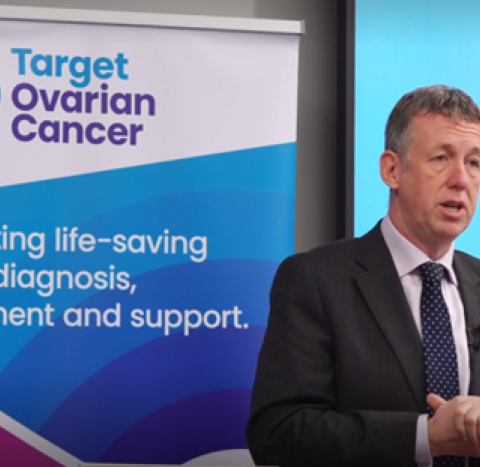The idea
Led by Professor Richard Edmondson at the University of Manchester, this project aimed to develop a more personalised approach to treating ovarian cancer through a better understanding of the range and type of mutation that occur in DNA damage response (DDR) pathways in ovarian cancer tumours.
Project background
Damage to DNA is a common event –there may be thousands of breaks in the DNA in any of the cells in our body each day. Most of these breaks are repaired in the cell in a process called 'DNA damage response', known as DDR pathways. Most, if not all, cancer cells have some defects in one or more of their DNA damage response pathways. This means the call cannot repair DNA and therefore damaged DNA accumulates in the cells and this contributes to the cell becoming cancerous and forming a tumour.
The good news is that this damage to the DDR pathways makes the cell vulnerable – so treatments could exploit this and trigger cell death. For example, PARP inhibitors kill cells by stopping a particular mechanism of DNA repair. Because normal cells don’t have this problem the PARP inhibitor is not toxic to them.
Given the range of pathways involved in repairing DNA, and the range of new drugs being developed to target them, it is important to identify the specific defects in each patient’s tumour before an effective treatment can be delivered. This project sought to develop new techniques to identify which DNA damage response pathways are broken in different tumours.
Project plan
Prior to the project starting, the team developed assays (special tests) to show which DDR defects were present in high grade serous ovarian cancer tumour samples. With our funding, the team used these assays to analyse samples from patients, and to improve the assays so that one day they might be able to be used in the clinic.
Research results
The team developed, optimised, deployed, and validated a suite of assays to map DNA damage response in ovarian cancer samples taken from patients undergoing surgery for advanced ovarian cancer.
The team found that elements of the DDR pathway were defective in all samples, but each sample displayed a slightly different pattern of the DNA damage response.
Researchers used the patterns of DNA damage response defects to see if they could predict outcomes in patients. First, they used the patterns to predict the response of cancer cells to chemotherapy in the lab environment and showed a strong association. They then used the patterns to predict clinical outcome and showed a very strong association between the signature and the likelihood of relapse of the disease.
Why is this research important to those affected by ovarian cancer?
The assays developed in Manchester may one day be ready to be used in the clinic to help clinicians predict which patients are likely to benefit from treatments. This could hopefully ensure that the people who will benefit from treatment receive it, while people who will not benefit from treatment will not have to take it and therefore avoid the harmful side-effects.
Fact file
Researcher: Professor Richard Edmondson
Institution: University of Manchester
Project dates: January 2018 to January 2021
Funding awarded: £198,414
Project status: complete
Key publications:
Walker TDJ, Faraahi ZF, Price MJ, Hawarden A, Waddell CA, Russell B, et al. The DNA damage response in advanced ovarian cancer: functional analysis combined with machine learning identifies signatures that correlate with chemotherapy sensitivity and patient outcome. British Journal of Cancer, 2023. DOI: https://doi.org/10.1038/s41416-023-02168-3
Brief overview film of the project by Professor Richard Edmondson.
Professor Richard Edmondson (Professor of Gynaecological Oncology at the University of Manchester) discusses the advances in ovarian cancer research, before outlining his most recent project funded by Target Ovarian Cancer. This talk took place in Manchester on Thursday 20th April 2023.



